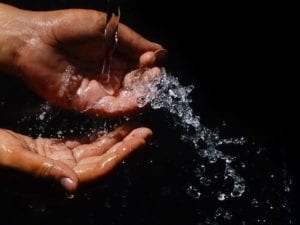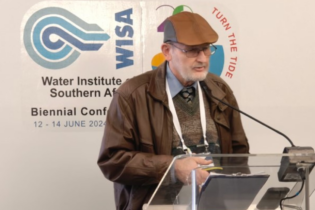There is no evidence that COVID-19 will contaminate water supplies, but the pandemic has highlighted water challenges putting communities’ health at risk, say industry stakeholders.
Panellists participating in a high-level webinar hosted by Messe Muenchen South Africa, organiser of IFAT Africa, said last week that although international scientists were using COVID-19 RNA in sewage to track the prevalence of the virus in communities, there was no evidence that COVID-19 could pose a risk via drinking water. However, the pandemic was highlighting the health risks up to 30% of the South African population faces through lack of access to piped water. The virus does not survive waste-water treatment plant processing or the treatment for reuse, the panellists said. “There have been concerns that this virus could enter the water supply, but the good news is that with proper disinfection of waste water, we should not see the viruses entering rivers, and proper filtration should eliminate any risk in the drinking water supply,” said Hennie Pretorius, Industry Manager Water and Waste Water at Endress + Hauser. “There is no evidence of COVID-19 entering water supply systems at this stage, but even if it did, the technology exists to remove such viruses,” said Henk Smit, MD of Vovani Water Products. Panellists said the pandemic had highlighted the health risks facing those South Africans who do not have access to treated, piped water, however. Taking tanks of water to underserved areas raised water quality concerns, while shared taps increased communities’ risk of contracting the virus, they noted.Achim Wurster, Chairman of the Water Institute of South Africa (WISA) said that here could be some risks in the standpipes in poorer communities, where people congregate and touch the tap – and this is where education comes in.
“But we are not aware of cases of viable virus coming through treatment processes and infecting people.” Moderator Benoit Le Roy, CEO of Enviro One, noted that this crisis is highlighting our deficiencies. “Nearly half the water we harvest, treat and convey at great cost is wasted, and we are running out of surface water and ground water. So, some of the obvious measures are to reduce, reuse and augment. But we need the political will, and the financial and risk models to implement that. I believe there is sufficient funding, technology, implementation capability and pedigree to give us water security, so that in times like this, when we have a catastrophe on our hands, we don’t exacerbate the health risks the underserved 30% of the population is exposed to.” The panellists said that effective implementation of the Department of Water and Sanitation’s Water and Sanitation Master Plan for national water security required stepped up effort and improved public-private collaboration. “This pandemic has brought our inefficiencies to light, and it will hopefully create more opportunities for government and private sector to sit together and find solutions, drive certain projects and get things done faster,” said Smit. South Africa’s water supply and treatment challenges, solutions and opportunities will come under discussion at IFAT Africa, the leading trade fair for water, sewage, refuse and recycling, at Gallagher Estate in Johannesburg from July 13 to 15, 2021.





